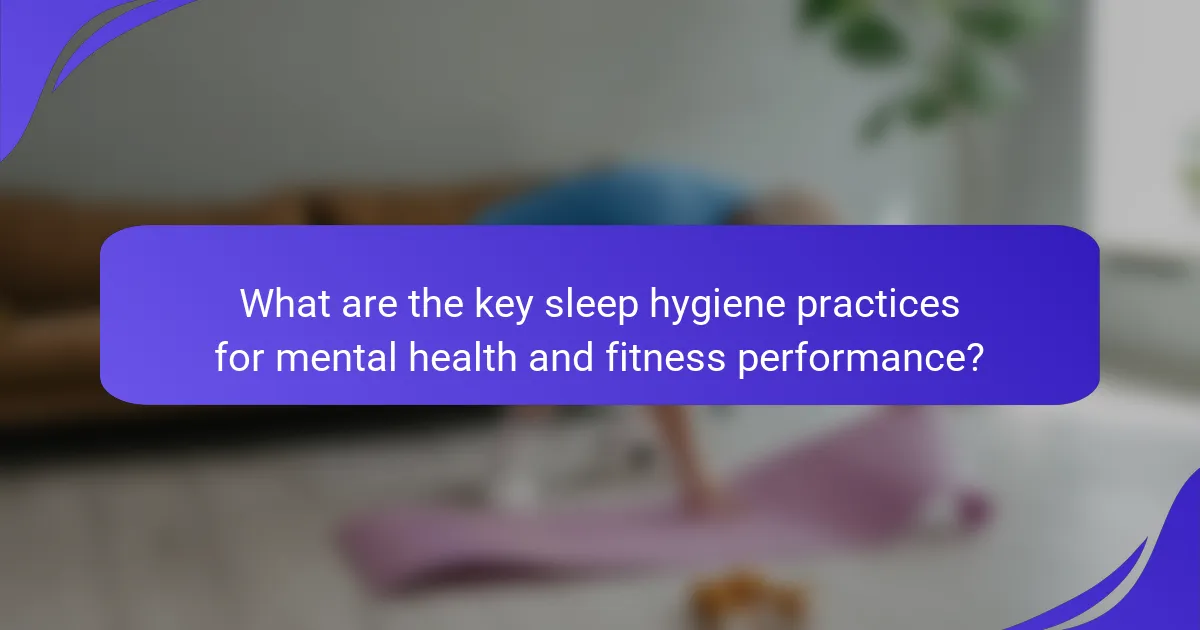Effective sleep hygiene practices can significantly enhance mental health and fitness performance. Key strategies include maintaining a consistent sleep schedule, creating a calming bedtime routine, and optimizing your sleep environment. Limiting screen time before bed and avoiding stimulants also play crucial roles in promoting restorative sleep. Implementing these practices can lead to improved mood, cognitive function, and athletic performance.

What are the key sleep hygiene practices for mental health and fitness performance?
Key sleep hygiene practices significantly enhance mental health and fitness performance. Prioritize a consistent sleep schedule, creating a calming bedtime routine, and optimizing your sleep environment.
1. Maintain a regular sleep schedule by going to bed and waking up at the same time daily.
2. Create a relaxing pre-sleep routine, such as reading or meditating, to signal your body it’s time to rest.
3. Optimize your sleep environment: keep the room dark, cool, and quiet to promote restorative sleep.
4. Limit screen time before bed to reduce blue light exposure, which can disrupt melatonin production.
5. Avoid caffeine and heavy meals close to bedtime to prevent sleep disturbances.
6. Incorporate physical activity during the day to improve sleep quality and overall well-being.
Implementing these practices can lead to improved mood, cognitive function, and athletic performance.
How does sleep quality impact mental health?
Sleep quality significantly influences mental health by affecting mood, stress levels, and cognitive function. Poor sleep can lead to anxiety, depression, and decreased emotional resilience. Research shows that individuals with better sleep hygiene report improved mental well-being and enhanced fitness performance. Establishing consistent sleep routines, creating a relaxing bedtime environment, and limiting screen time before sleep are essential practices to enhance sleep quality. Prioritizing sleep hygiene not only supports mental health but also optimizes physical performance, making it a critical focus for overall wellness.
What role does sleep play in fitness performance?
Sleep significantly enhances fitness performance by improving recovery, focus, and overall physical health. Adequate sleep supports muscle repair and growth, which are crucial for athletes. Studies show that sleep deprivation can lead to decreased strength, endurance, and cognitive function. For instance, athletes who sleep less than seven hours a night may experience a 20% reduction in performance. Prioritizing sleep hygiene practices, such as maintaining a consistent sleep schedule and creating a restful environment, can optimize athletic outcomes and mental well-being.

What universal attributes define effective sleep hygiene?
Effective sleep hygiene is defined by consistent sleep schedules, a conducive sleep environment, and relaxation techniques. Maintaining a regular sleep routine enhances mental health and fitness performance. Key practices include limiting screen time before bed, avoiding caffeine in the evening, and creating a dark, quiet sleeping space. Research shows that individuals who prioritize these habits experience improved sleep quality and cognitive function.
How does maintaining a consistent sleep schedule benefit overall health?
Maintaining a consistent sleep schedule significantly enhances overall health. It regulates circadian rhythms, improving sleep quality and mental clarity. Consistency helps reduce stress and anxiety, which are crucial for mental health. Studies show that regular sleep patterns can boost athletic performance by optimizing recovery and energy levels. Sleep hygiene practices, including a fixed sleep schedule, lead to better physical and mental fitness outcomes.
What is the significance of creating a sleep-friendly environment?
Creating a sleep-friendly environment is crucial for enhancing mental health and fitness performance. Factors such as optimal room temperature, minimal noise, and comfortable bedding significantly influence sleep quality. A dark, quiet space promotes deeper sleep cycles, which are essential for recovery and cognitive function. Studies show that individuals with a dedicated sleep environment experience improved mood and better physical performance. Prioritizing such an environment can lead to lasting benefits in overall wellness.
What elements contribute to an optimal sleep environment?
An optimal sleep environment includes factors such as darkness, quietness, comfortable temperature, and a supportive mattress. These elements enhance sleep quality, which is essential for mental health and fitness performance.
Darkness promotes melatonin production, aiding in falling asleep faster. Quietness minimizes disturbances, allowing for uninterrupted sleep cycles. A comfortable temperature, ideally between 60-67°F, supports better rest. Additionally, a supportive mattress reduces discomfort and aligns the spine, contributing to restorative sleep.
How does limiting screen time before bed affect sleep quality?
Limiting screen time before bed significantly improves sleep quality. Reducing exposure to blue light enhances melatonin production, leading to deeper sleep cycles. Studies indicate that individuals who avoid screens for at least one hour before sleeping report better sleep duration and improved mental clarity the following day. This practice is a key component of effective sleep hygiene, promoting overall mental health and fitness performance.

What unique sleep hygiene practices can enhance performance?
Unique sleep hygiene practices can significantly enhance performance by promoting restorative sleep. Prioritizing consistent sleep schedules helps regulate circadian rhythms, improving overall sleep quality. Creating a relaxing bedtime routine, such as reading or meditating, can lower stress levels and facilitate better rest. Additionally, optimizing the sleep environment by controlling light, noise, and temperature fosters deeper sleep stages. Limiting screen time before bed reduces blue light exposure, which can disrupt melatonin production. Incorporating these unique practices supports mental health and boosts fitness performance.
How can personalized sleep routines improve fitness outcomes?
Personalized sleep routines significantly enhance fitness outcomes by optimizing recovery and performance. Tailored sleep schedules align with individual circadian rhythms, leading to improved sleep quality. Research indicates that quality sleep boosts muscle recovery, increases endurance, and enhances cognitive function. For example, athletes with consistent sleep patterns report better performance metrics and reduced injury rates. Prioritizing sleep hygiene practices, such as maintaining a cool bedroom environment and minimizing screen time before bed, further supports these benefits.
What specific dietary choices can promote better sleep?
Certain dietary choices can significantly enhance sleep quality. Consuming foods rich in magnesium, such as leafy greens and nuts, promotes relaxation. Additionally, incorporating complex carbohydrates like whole grains can help regulate serotonin levels, aiding sleep onset. Foods high in tryptophan, such as turkey and dairy, support melatonin production, further enhancing sleep. Avoiding caffeine and heavy meals close to bedtime is crucial for uninterrupted rest.

What rare attributes should be considered in sleep hygiene?
Rare attributes to consider in sleep hygiene include the impact of light exposure on circadian rhythms, the influence of sleep environment acoustics, and individual variations in sleep needs based on genetics. These factors can significantly affect mental health and fitness performance. Understanding these unique aspects can lead to tailored sleep hygiene practices that promote better overall well-being.
How do individual variations in sleep needs affect hygiene practices?
Individual variations in sleep needs significantly influence sleep hygiene practices. People with different sleep requirements may adopt unique routines to optimize their rest. For example, those needing more sleep might prioritize longer bedtime rituals, while others may focus on quick, effective strategies. Research indicates that personalized sleep hygiene can enhance mental health and fitness performance. Tailoring practices such as consistent sleep schedules, sleep environment optimization, and relaxation techniques can lead to improved outcomes. Understanding these individual differences is crucial for effective sleep hygiene implementation.
What uncommon strategies can enhance sleep quality?
To enhance sleep quality, consider implementing uncommon strategies such as aromatherapy, utilizing weighted blankets, and practicing mindfulness meditation. Aromatherapy with essential oils, like lavender, can promote relaxation and improve sleep onset. Weighted blankets provide deep pressure stimulation, which may reduce anxiety and improve overall sleep quality. Mindfulness meditation helps calm the mind, making it easier to fall asleep and stay asleep. These techniques can significantly contribute to better mental health and fitness performance.

How do cultural perceptions of sleep influence hygiene practices?
Cultural perceptions of sleep significantly shape hygiene practices, influencing how individuals prioritize rest. In cultures emphasizing productivity, sleep may be undervalued, leading to poor hygiene practices. Conversely, cultures that recognize sleep as essential promote routines that enhance mental health and fitness performance. For example, in some societies, napping is integrated into daily life, reinforcing the importance of adequate rest. As a result, these practices can foster better overall health outcomes.
What are the common sleep challenges faced in different regions?
Common sleep challenges vary by region but often include insomnia, sleep apnea, and stress-related issues. In North America, high stress levels and lifestyle factors contribute to insomnia. In Europe, cultural differences in work-life balance impact sleep quality. In Asia, urbanization and technology use lead to increased sleep disturbances. In Africa, limited access to healthcare affects sleep disorders. Addressing these challenges through improved sleep hygiene practices can enhance mental health and fitness performance globally.
How can local customs shape sleep hygiene approaches?
Local customs significantly influence sleep hygiene approaches by integrating cultural values and practices. For instance, in some cultures, communal sleeping arrangements promote social bonds, enhancing mental well-being. Additionally, traditional bedtime rituals, such as herbal teas or meditation, reflect unique attributes that contribute to improved sleep quality. These practices can vary widely; for example, while some cultures prioritize complete darkness for sleep, others may incorporate ambient light or sounds, showcasing rare attributes in sleep environments. Understanding these customs allows for tailored sleep hygiene strategies that resonate with individual lifestyles, ultimately improving mental health and fitness performance.

What are the best practices for optimizing sleep hygiene?
To optimize sleep hygiene, establish a consistent sleep schedule, create a restful environment, limit screen time before bed, and avoid stimulants. These practices enhance mental health and fitness performance by promoting restorative sleep.
A consistent sleep schedule helps regulate the body’s internal clock, improving sleep quality. Creating a restful environment includes keeping the bedroom dark, quiet, and cool, which supports better sleep. Limiting screen time before bed reduces exposure to blue light, promoting natural melatonin production. Avoiding stimulants like caffeine and nicotine in the hours leading up to sleep can prevent disruptions in sleep patterns.
Implementing these practices can lead to significant improvements in overall well-being and athletic performance.
What common mistakes should be avoided in sleep hygiene?
To improve sleep hygiene, avoid common mistakes such as inconsistent sleep schedules, excessive screen time before bed, and consuming caffeine or heavy meals late in the evening. Prioritizing a regular sleep routine enhances mental health and fitness performance. Additionally, neglecting to create a comfortable sleep environment can significantly impact sleep quality.
How can one implement effective sleep hygiene tips immediately?
To implement effective sleep hygiene tips immediately, establish a consistent sleep schedule, create a relaxing bedtime routine, and optimize your sleep environment. Prioritize a dark, quiet, and cool room to enhance sleep quality. Limit screen time before bed to reduce blue light exposure, which affects melatonin production. Consider incorporating mindfulness or relaxation exercises to ease the transition to sleep.



